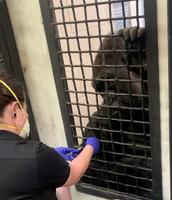ABQ BioPark’s Most Vulnerable Animals Now Vaccinated Against COVID-19
July 29, 2022 - You’ve heard about the push to get people vaccinated against COVID-19, but now several of the ABQ BioPark Zoo’s animals are protected too!
The BioPark received 60 doses of the Zoetis vaccine, and started vaccinating big cats and primates in late June. With this initial shipment of vaccines, which required a booster dose after three weeks, the BioPark vaccinated 30 animals.
Zoetis is donating doses of its experimental vaccine to zoos across the world. So far, at least 70 institutions have received the vaccine.
Some of the BioPark’s first recipients include gorillas, orangutans, snow leopards, otters, cheetahs, Bunga the tiger, Ken the lion and chimpanzees. The BioPark chose animals based on their susceptibility to the virus. For example, each one of the Zoo’s three snow leopards were vaccinated because COVID-19 has been found to be particularly deadly among snow leopards in zoos. Primates, especially great apes, and big cats are also susceptible, making them a priority to receive the vaccine as well.
“We are incredibly excited to vaccinate some of our most vulnerable animals,” said Dr. Carol Bradford, ABQ BioPark senior veterinarian. “In addition to the precautions our staff has provided since the beginning of this pandemic, this will offer an extra level of protection to our animals.”
Preparing the Animals for Vaccines
Vaccinations are nothing new at the BioPark. For example, the BioPark’s cats receive a feline combination vaccine, canines receive a distemper vaccine, some birds receive a West Nile vaccine, zebras and rhinoceroses get a combination vaccination, and primates get vaccinated for tetanus. Almost all of the BioPark’s mammals are vaccinated against rabies.
Valarie Thietten, senior carnivore keeper, and Josephine Molina, senior primate keeper, said having their animals trained for voluntary hand injections is a number one priority, and they are constantly working towards this end. There is an exceptional amount of trust that needs to exist between animal and zookeeper in order for the animal to willing accept the needle poke. Training methods are a little different between big cats and primates, however.
Thietten said carnivore staff first introduce the big cats to the feeling of a poke by touching them with a paper clip. They start with a slight touch and increase the pressure throughout the course of training.
Molina said the intelligence of the primates can make training them to voluntarily accept the injections especially difficult. “Just imagine trying to train your child to hold still when they’re getting a shot at the pediatricians and come back over for another six weeks later. They know exactly what you’re doing, so you have to break it up into baby steps.”
In general, they’ll first simply introduce the needle visually to desensitize the primates to this new item. Then, they’ll introduce a needle with a cap on, and will start showing the needle little by little. Next, they’ll move on to touching the ape with a blunted needle or even a paper clip. Eventually, they will break the skin with a real needle. Once the animal accepts the skin break, keepers will move on to injecting the animal with a saline solution, which mimics the sensation of a vaccination going in.
In the case of both cats and primates, animals can always choose whether or not to participate in training, and only positive reinforcement, such as food, is used. Any time one of the apes makes a breakthrough in their training, they receive a “jackpot,” which is an extra special treat. For primates, that could include yogurt, cottage cheese or marshmallows. For cats, that could include brisket or chicken necks.
Protecting Animal and Human Health
Before deciding to accept the vaccine for the BioPark’s animals, Bradford did extensive research, including talking to veterinarians at other AZA-accredited institutions about possible side effects.
“Obviously we’re not going to give something to these very precious and endangered animals if it’s not safe,” Bradford said.
According to Bradford, Thietten and Molina, none of the BioPark’s animals have had adverse reactions, which can include lethargy and redness at the injection site.
Vaccines such as this are all part of the BioPark’s preventative care program, which also includes preventative blood tests, x-rays, ultrasounds and dental care.
“With most diseases, you’d rather prevent it than treat it,” Bradford said. “We don’t want our animals to be sick or potentially pass something on to other animals or to a person.”
The COVID-19 pandemic has been stressful for animal care staff, who in addition to worrying about their own health, have taken even more responsibility to protect the animals in their care.
“It’s been rough, just like you’d worry about your family at home,” Thietten said. “We are here to care of these animals, so we did anything necessary to protect them.”
This includes adjusting the visitor path around some of the big cats to keep visitors a little further away. And both primate and cat staff have continued masking up and using protective gloves while working around the animals. In addition, behind-the-scenes tours for big cats and primates have not resumed in order to further protect these animals.
“We’re really thankful that these vaccines are available to our animals now,” Thietten said. “It gives us a little peace of mind.”
Both Molina and Thietten want the public to know that they can help protect the animals through their actions when visiting the zoo. One important thing they want visitors to know is that throwing items in the exhibits can endanger animal health by introducing illnesses and even possibly upsetting social structures among animals.
“Everyone has a part to play, and this is just one simple thing visitors can do to help protect our animals,” Molina said.

